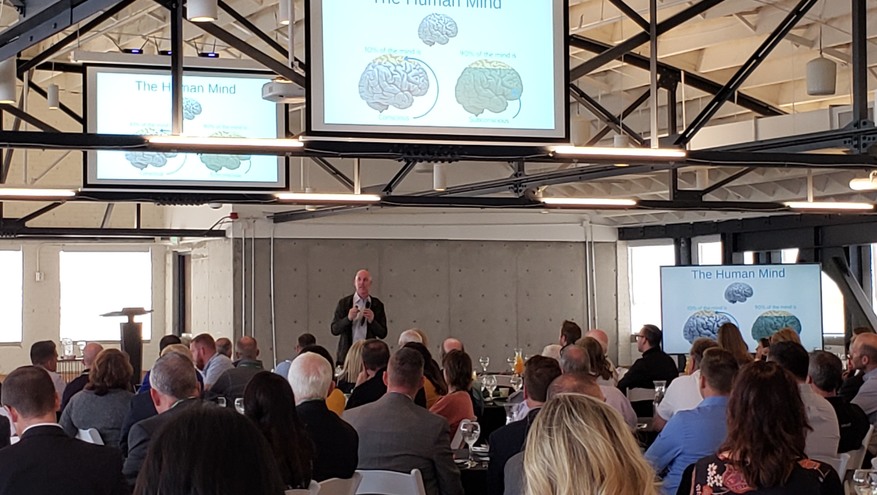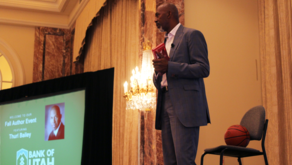What do business leaders and pro athletes have in common? They both need to be “high-performing” in order to succeed. Bank of Utah recently invited pro sports performance psychologist Dr. Craig Manning to speak to customers and friends about how to do just that, at Fall Speaker Events in Logan, Ogden, Salt Lake and Provo in October.
Manning, a world-renowned speaker, consultant and bestselling author of The Fearless Mind, shared some of his secrets for controlling your mind to overcome fears, expel anxiety and build confidence to become a high-performing individual.
A former professional tennis player and BYU and Olympic sports psychology consultant, Manning helps athletes channel their focus and energy to optimize their potential. According to Manning many people when asked to perform, allow their insecurities to hold them back. He shared intriguing stories of how he counseled an NBA team to a championship and six U.S. Olympic ski and snowboarding team athletes to take home the gold in the Sochi 2014 Olympic Winter Games.
The science of neuroplasticity is at the heart of Manning’s work and he briefly explained how to develop a “fearless mind” through several steps. He said there are two paths of thought that people can take: being reactive or proactive. Being reactive, is based on the ego and relies on praise from others for motivation. Emotionally reacting to life’s challenges creates anxiety and a “fight or flight” response that creates a downward emotional spiral of self-doubt. Focusing on what you “can’t do” and your opponents, can make athletes choke and lost their mental focus.
On the flip side, using “proactive” thinking, which means solving problems by taking action to move forward, gives a person control, purpose and direction. According to Manning, being proactive for an athlete means tapping into what they do best to win the game rather than focusing on their opponent’s strengths. Being proactive unlocks the unconscious mind and helps a person draw upon their knowledge to find winning solutions.
Manning spoke of helping the BYU Women’s Volleyball Team, which at that time consisted of six seniors and four freshmen. Taking on a pro-active mindset and focusing on what they do best helped this young team make it to the final four and beat the higher-ranking University of Utah team in the NCAA championship competition.
“It’s never about beating others,” said Manning. He explained that focusing on how good the other team is, makes the mind think, “then we must be bad.” Focusing on your own team’s strengths and proactively planning steps to use them to your advantage is “playing to win.” He said that egos get in the way of a team’s success and learning how to be selfless helps athletes unlock their skills and use teamwork to win.
Manning shared steps to keeping on a proactive path. He suggests that you:
1) Decide what you want in life based on your own talents and passions.
2) Set micro-goals and determine the skills you need to acquire to achieve those goals.
3) Start a journal and every evening write down three things that you did well that day and one proactive step that you can take the following day to propel yourself to meet your goals.
4) Concentrate on being task oriented, working hard and being humble to propel yourself forward.
Thinking positive, according to Manning, is not the same thing as being proactive. Being positive doesn’t create actions that change mindsets and lives. Knowing what you want in life makes you feel secure and leads to selflessness and generosity and an outward-facing attitude that leads to true happiness and success. And when you have that secure, proactive attitude, it becomes easy for you to give positive reinforcement to family, friends and co-workers, which will help them on their proactive journey as well.
Bank of Utah is grateful to Dr. Craig Manning for taking the time to share his life-changing steps with our co-workers, customers and friends. He holds a bachelor’s degree in psychology from Brigham Young University and a master's degree in psychology and a doctorate in sports psychology from the University of Utah. For more information about Manning’s work and book, The Fearless Mind, visit thefearlessmind.com.




